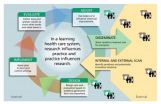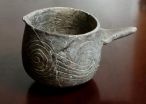(Press-News.org) Montreal, August 7, 2012 – Although it may not seem like much, the small wooden figurine Grandma brought back from the Holy Land has been blessed. She gives the souvenir to her grandchildren knowing she has done her job: deliver God into their lives.
A recent study led by Hillary Kaell, an associate professor in the Department of Religion at Concordia University, and published in the Journal of Material Culture looks at why and to whom people give souvenir gifts – an area of study that little is known about. For her research, she chose to focus on Christian American women, between the ages of 55 and 75, who travel to the Holy Land and who make souvenir purchasing an important part of their pilgrimage.
"Crucial in this endeavor is how pilgrims negotiate the fluid line between commodity and religious object," says Kaell, who mentions that according to the Israeli Census Bureau, more than 60,000 Canadians travel to Israel and the Palestinian Authority each year―most of whom are Christian pilgrims. "They imbue commercial souvenirs with divine presence therefore creating powerful tools for 'softly' asserting religion in their families' lives. Giving these souvenirs becomes another way to bolster faith."
Kaell based her study on ethnographic research conducted on the road in the Holy Land and then at pilgrims' homes after they had returned. Conversation interviews were held with 99 pilgrims and 34 industry professionals, the majority of the interviews consisting of pre and post trip conversations with pilgrims from five groups (three evangelical and two Catholic), as well as participant observation with two of these groups in the Holy Land.
What she found was that the gifts the women bought in the Holy Land were classified into two major groups: undirected ones for acquaintances and directed ones for family, especially children. These women expressed how they felt responsible for perpetuating their faith in the family – driving many of their religious behaviours, such as praying for their children, organizing baptisms and taking grandchildren to church.
The purchasing of the souvenirs in the Holy Land becomes an extension of this behaviour. By giving the gifts the women hope to spark an interest in religion. If the children are reticent to accept religious gifts, the gifts are delivered as souvenirs. The women believe that once accepted and displayed the Holy Land gift can open a way to a conversation with God, which fulfills the pilgrim's desire to pass faith down to the next generation.
"These women are very capable of harnessing the ability to portray the gifts as souvenirs sometimes and religious gifts other times," says Kaell. "A souvenir as a divine-presence filled gift can circumvent the problem of having a religious gift rejected—whether the child understands the true significance of the gift or not. The key is, a very important reason for their pilgrimage has been fulfilled."
###Research, continued: This study is a component of a larger book project that will be published with New York University Press.
Related links:
Of gifts and grandchildren: American Holy Land souvenirs: http://mcu.sagepub.com/content/17/2/133.abstract
Concordia University's Department of Religion: http://religion.concordia.ca/
Keeping the faith through souvenirs
Concordia study uncovers the real meaning of Grandma's gift buying in the Holy Land
2012-08-07
ELSE PRESS RELEASES FROM THIS DATE:
Method to prevent rejection of disease-fighting proteins described in Human Gene Therapy journal
2012-08-07
New Rochelle, NY, August 7, 2012—The body's natural reaction to reject replacement proteins represents a major obstacle to the successful use of gene therapy to cure a range of life-threatening diseases. A novel method that uses the body's own immune cells to induce tolerance to a specific protein was shown to suppress the rejection response, as described in an article in Human Gene Therapy, a peer-reviewed journal from Mary Ann Liebert, Inc.
(http://www.liebertpub.com). The article is available free online at the Human Gene Therapy (http://www.liebertpub.com/hum) website.
"A ...
Composite nanofibers developed by Penn scientists next chapter in orthopaedic biomaterials
2012-08-07
PHILADELPHIA – Bioengineered replacements for tendons, ligaments, the meniscus of the knee, and other tissues require re-creation of the exquisite architecture of these tissues in three dimensions. These fibrous, collagen-based tissues located throughout the body have an ordered structure that gives them their robust ability to bear extreme mechanical loading.
Many labs have been designing treatments for ACL and meniscus tears of the knee, rotator cuff injuries, and Achilles tendon ruptures for patients ranging from the weekend warrior to the elite Olympian. One popular ...
California's hydroelectricity production is vulnerable to climate change
2012-08-07
RIVERSIDE, Calif. — California's hydropower is vulnerable to climate change, a University of California, Riverside scientist has advised policymakers in "Our Changing Climate," a report released July 31 by the California Natural Resources Agency and the California Energy Commission (CEC).
"Climate change is expected to affect the quantity and timing of water flow in the state," explained Kaveh Madani, a former postdoctoral research scholar in UC Riverside's Water Science and Policy Center (WSPC), who led a research project on climate change effects on hydropower production, ...
Annals of Internal Medicine tip sheet for Aug. 7, 2012 issue
2012-08-07
1. Tuning into Contextual Clues May Help Doctors Improve Antibiotic Prescribing Habits
Appropriate use of antibiotics can improve patient outcomes and reduce risk for antibiotic resistance. Febrile respiratory illnesses, or FRI, often present with vague, cold-like symptoms, making it difficult to discern whether the illness is viral or bacterial. Since there are few bedside clues that reliably distinguish viral from bacterial, physicians rely on contextual factors to aid treatment decisions. Contextual factors include epidemiology (for example, flu pandemic period) and ...
Fainting: All in the family?
2012-08-07
MINNEAPOLIS – Fainting has a strong genetic predisposition, according to new research published in the August 7, 2012, print issue of Neurology®, the medical journal of the American Academy of Neurology. Fainting, also called vasovagal syncope, is a brief loss of consciousness when your body reacts to certain triggers, such as emotional distress or the sight of blood.
"The question of whether fainting is caused by genetic factors, environmental factors or a mixture of both has been the subject of debate," said study author Samuel F. Berkovic, MD, FRS, with the University ...
A 'learning health system' moves from idea to action
2012-08-07
In the United States, clinicians are struggling to provide better and more affordable health care to more people—while keeping up with new scientific developments. The idea of a "learning health system" is one proposed solution for rapidly applying the best available scientific evidence in real-time clinical practice. In the August 7 Annals of Internal Medicine, a Group Health Cooperative team describes the experience of turning this intriguing concept into action.
"In a learning health system, evidence and practice come together in a virtuous cycle, influencing each ...
Researchers peek at the early evolution of sex chromosomes
2012-08-07
CHAMPAIGN, Ill. — Two new studies offer insight into sex chromosome evolution by focusing on papaya, a multimillion dollar crop plant with a sexual problem (as far as growers are concerned) and a complicated past. The findings are described in two papers in the Proceedings of the National Academy of Sciences.
The research reveals that the papaya sex chromosomes have undergone dramatic changes in their short evolutionary histories (they are about 7 million years old; by comparison, human sex chromosomes began their evolution more than 167 million years ago). One of the ...
Researchers find evidence of ritual use of 'black drink' at Cahokia
2012-08-07
CHAMPAIGN, Ill. — People living 700 to 900 years ago in Cahokia, a massive settlement near the confluence of the Missouri and Mississippi Rivers, ritually used a caffeinated brew made from the leaves of a holly tree that grew hundreds of miles away, researchers report.
The discovery – made by analyzing plant residues in pottery beakers from Cahokia and its surroundings – is the earliest known use of this "black drink" in North America. It pushes back the date by at least 500 years, and adds to the evidence that a broad cultural and trade network thrived in the Midwest ...
Generic language helps fuel stereotypes, NYU, Princeton researchers find
2012-08-07
Hearing generic language to describe a category of people, such as "boys have short hair," can lead children to endorse a range of other stereotypes about the category, a study by researchers at New York University and Princeton University has found. Their research, which appears in the Proceedings of the National Academy of Sciences (PNAS), also points to more effective methods to reduce stereotyping and prejudice.
The study focused on "social essentialism," or the belief that certain social categories, such as race or gender, mark fundamentally distinct kinds of people. ...
Gladstone scientists discover that epilepsy drug reverses memory loss in animal model of AD
2012-08-07
SAN FRANCISCO, CA—August 6, 2012— Scientists at the Gladstone Institutes have discovered that an FDA-approved anti-epileptic drug reverses memory loss and alleviates other Alzheimer's-related impairments in an animal model of the disease.
Scientists in the laboratory of Lennart Mucke, MD, who directs neurological research at Gladstone, conducted the research on mice genetically modified to simulate key aspects of Alzheimer's disease. In the study, they show how levetiracetam—a drug commonly prescribed for patients who suffer from epilepsy—suppresses abnormal brain activity ...
LAST 30 PRESS RELEASES:
Paleontologist Stephen Chester and colleagues reveal new clues about early primate evolution
UF research finds a gentler way to treat aggressive gum disease
Strong alcohol policy could reduce cancer in Canada
Air pollution from wildfires linked to higher rate of stroke
Tiny flows, big insights: microfluidics system boosts super-resolution microscopy
Pennington Biomedical researcher publishes editorial in leading American Heart Association journal
New tool reveals the secrets of HIV-infected cells
HMH scientists calculate breathing-brain wave rhythms in deepest sleep
Electron microscopy shows ‘mouse bite’ defects in semiconductors
Ochsner Children's CEO joins Make-A-Wish Board
Research spotlight: Exploring the neural basis of visual imagination
Wildlife imaging shows that AI models aren’t as smart as we think
Prolonged drought linked to instability in key nitrogen-cycling microbes in Connecticut salt marsh
Self-cleaning fuel cells? Researchers reveal steam-powered fix for ‘sulfur poisoning’
Bacteria found in mouth and gut may help protect against severe peanut allergic reactions
Ultra-processed foods in preschool years associated with behavioural difficulties in childhood
A fanged frog long thought to be one species is revealing itself to be several
Weill Cornell Medicine selected for Prostate Cancer Foundation Challenge Award
Largest high-precision 3D facial database built in China, enabling more lifelike digital humans
SwRI upgrades facilities to expand subsurface safety valve testing to new application
Iron deficiency blocks the growth of young pancreatic cells
Selective forest thinning in the eastern Cascades supports both snowpack and wildfire resilience
A sea of light: HETDEX astronomers reveal hidden structures in the young universe
Some young gamers may be at higher risk of mental health problems, but family and school support can help
Reduce rust by dumping your wok twice, and other kitchen tips
High-fat diet accelerates breast cancer tumor growth and invasion
Leveraging AI models, neuroscientists parse canary songs to better understand human speech
Ultraprocessed food consumption and behavioral outcomes in Canadian children
The ISSCR honors Dr. Kyle M. Loh with the 2026 Early Career Impact Award for Transformative Advances in Stem Cell Biology
The ISSCR honors Alexander Meissner with the 2026 ISSCR Momentum Award for exceptional work in developmental and stem cell epigenetics
[Press-News.org] Keeping the faith through souvenirsConcordia study uncovers the real meaning of Grandma's gift buying in the Holy Land





